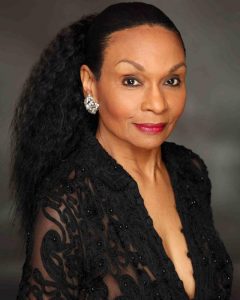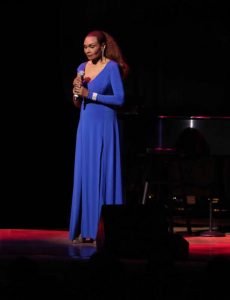
 Known for her poise, grace and dramatic interpretations, Vivian Reed has conquered every medium in the entertainment industry. She’s a two-time Tony nominee, a successful recording artist, an accomplished dancer and fashion designer. Her polished performances and flair for grand glamour make her the ideal nightclub artist, which is why she’s embarking on a series of concerts at the renowned Metropolitan Room. In Standards and More, Ms. Reed will delight her audiences with renditions of songs that hold a special place in her heart, while sharing stories about her career. We spoke to her about the concerts, her process, and what’s next for her.
Known for her poise, grace and dramatic interpretations, Vivian Reed has conquered every medium in the entertainment industry. She’s a two-time Tony nominee, a successful recording artist, an accomplished dancer and fashion designer. Her polished performances and flair for grand glamour make her the ideal nightclub artist, which is why she’s embarking on a series of concerts at the renowned Metropolitan Room. In Standards and More, Ms. Reed will delight her audiences with renditions of songs that hold a special place in her heart, while sharing stories about her career. We spoke to her about the concerts, her process, and what’s next for her.
What can you tell us about the show you’ll be doing at The Metropolitan Room? What goes into creating a setlist for a cabaret show?
The show is called An Evening with Vivian Reed: Standards and More, and I think it was during one of my shows at 54 Below, where an elderly lady mentioned she loved the show but especially the standards that I started thinking about doing a show with just standards. You can cover the gamut, soul standards, R&B standards, but the ones in my show are the old classics. It was easy for me to put it together because I only sing songs that mean something to me, whether it’s the lyrics or the music. The show has classics, theatre pieces, unknown pieces that fall into the “more” part.
One of your signature songs is “God Bless the Child”, which has been recorded by many other artists. What would you say it takes to make a song like that “yours”?
When I was approached about doing Bubbling Brown Sugar there was no role for me, they said they loved the singing, but when we got into rehearsals the musical director started offering me songs, I actually didn’t want to do “God Bless the Child” because I thought it was too jazz, he said I could do it however I wanted. So I went about, studying the piece, what chords I needed to hear to put my heart and soul in it, and then it had my stamp on it.
Can you talk about the theatricality you bring to your concert performances? Do you try telling entire stories within one song for instance?
I am a performer and I love delivering the lyrics to the audience, so they receive what I’m doing. So from the moment I walk onstage when they call my name, I’m already in the moment, it is about the lyrics, delivering them and making them real for the audience. I don’t do anything special to get there, I’ve always been like that, I did it even when I did classical music. Whether it’s jazz, funk, musical theatre, I just go there. It’s our job as performers not to just sing lyrics, but to go deeply into them, because somewhere in every audience, something in those lyrics is going to touch somebody. Every performer owes it to their audience to deliver the song, and you don’t need to be a great singer either, I’ve heard great singers who didn’t make my toe move, and I’ve heard great singers who just knocked me for a loop, like Cynthia Erivo in The Color Purple. Other singers who aren’t considered great have made me cry, it’s about delivering the message of the piece.

You were trained as a classical dancer, and I was curious about how much of that training comes into play when you perform?
Several aspects of it, I studied jazz more than I did ballet, but both my classical background and my jazz side come into play. I use my arms when I’m singing, I use them as part of telling my story, I tell my private students who take dance to let that come out in their performances. I don’t like seeing performers with weak hands, unless it’s part of the character. When I open my mouth I go somewhere within that piece of music, it consumes me to the point that delivering those lyrics is the only thing that matters.
I saw you perform at the Edith Piaf Centennial celebration and you took my breath away.
Thank you! I don’t think many people know how I chose the songs I performed there, so let me tell you about it. When I was invited to the show the producer told my manager that Elaine Paige would probably do the more known songs since she was the headliner, so my manager, who’s French, sent me various songs. As soon as I heard “Heaven Have Mercy”, even though I wasn’t familiar with it, I knew that was a song I would sing. The same happened with “Mon Dieu”. Edith Piaf was in many ways how I am as a performer, we both love using our hands, and drama. And even if our interpretations were different, she always wanted to transmit the message of the song.
Speaking of performing, what’s it going to take to have you back on Broadway?
I took time off to look after my mom. I didn’t regret taking that time to be with her, but I do understand “out of sight, out of mind”, but I had to be there for my mom. She and my dad encouraged me my whole life, according to them I was singing melodious tones when I was 3, they nourished my gift. They were always there for me, whether it was on Broadway or Europe, and I had to be there with my mom. When she passed, in my arms, I knew it was time to get back in my career. I was nervous, I didn’t know if people would show up or remember me. When you leave for a few years you just don’t know. No one will never know how moved I felt when I heard the audience applaud.
For tickets to Vivian Reed at The Metropolitan Room click here.